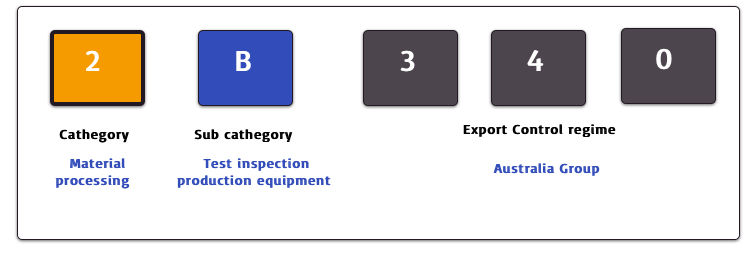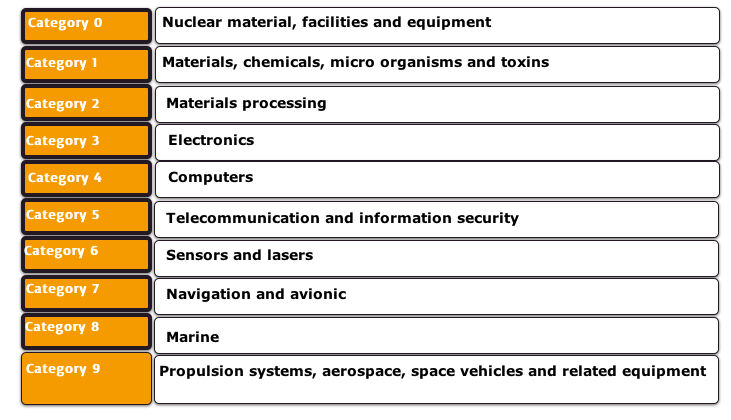
What is Export Control?
Dual-use items are goods, software and technology normally used for civilian purposes but which may have military applications, or may contribute to the proliferation of Weapons of Mass Destruction. That is the reason why the EU controls the export, transit and brokering of dual use items as a key instrument contributing to international peace and security.
Main industries under scope
Chemicals, metals and mining, engineering, plastics, automotive, life sciences industry, biotechnology, telecommunications, technology, oil & gas, aerospace or nuclear.

The Regulation 428/2009 sets up an EU system for the export of dual-use goods and its appendices include a list of dual-use items requiring license for export and in some sensitive cases for intra EU transfers of goods. The regulation refers to the definition of export sets up by the current Customs Community Code.
Therefore compliance becomes critical for companies dealing with such kind of goods and this control becomes more difficult for multinational enterprises involved in complex supply chain structures.
Risks of the lack of compliance: Monetary fines up to 1 EUR million in the EU per violation, imprisonment up to 20 years in the EU, death penalty in some Asian countries, blacklisting or reputational damage.
1.-EU control list
The EU control list in Annex I of EU regulation 428/2009 splits the different items under scope up to 9 categories (the list is periodically updated):

Every category is divided as well in 5 sub-categories:

The 3 final digits refer to the following regimens:

Example:

As explained above, items under Export Control can be tangible or intangible as software or technology in tangible items e.g. carried on pen-drive or exported e.g. by email, information given by phone or even downloaded from internet.
It is crucial to note that export should be understood as sale or transfer of own stock including free transfer and brokerage.
2.- Licenses
Dual-use goods not listed in the annexes of the Dual-use regulation in principle do not require a license. However, in some cases the competent Authority may require an ad-hoc basis a license (catch-all clause). Local regulations from the EU member states must be taken into account as well what make the scenario even more complex.
In 2004 a German trading company Manager was convicted to imprisonment for the export of aluminum tubes to North Korea based on a catch-all clause. Tubes could be used as well for the construction of gas centrifuges for uranium enrichment.
Regarding intra EU movements of goods in principle no license is required for the majority of Dual-use items. Although some EU countries require a license for intra-EU transfer followed by export outside EU ("indirect export"). Exceptions apply for transfer of most sensitive items.

Licenses currently existing in the EU
1.-Open licenses available for any EU company if certain requirements are met.
2.-Specific licenses that cover exports of one of more dual-use items to one end-user in a third country.
3.-Global licenses can be granted to one exporter and may cover multiple items to multiple destinations/end users.
4.-National licenses that can be issued by EU Member States for specific items (e.g. FR, DE, GR, IT, SE, ES NL or UK).
In order to apply for a License, the exporter needs to be established in the EU. What should be understood as established? What happen with supply chains with no EU entity involved?
Prior registration may also be required; this obligation may vary among EU countries.
3.- Key factors
Apart of the required licenses there are 3 key factors to consider in order to be compliance with this legislation:
1. Forbidden destinations to embargoed countries e.g. Syria or North Korea, Iran for certain ECCNs.
2. Forbidden uses.
3. Forbidden end users. Even where the item is non controlled certain users are restricted e.g. Denied Persons, Unverified or Entity List.
4.- USA extra-territorial principle
The US Export Control Regulation can also affect an export from the EU. USA regulation applies when dealing with US origin products, software or technology, or dealing with US owned companies regardless of where these companies are located (extra-territorial principle). This USA extra-territorial principle has been widely discussed.

The fine against ING B.V. for USA $619 millions is one of the largest fine ever in connection with dual use infringements of the USA Export Control Regulation. ING Bank, N.V. a Netherlands-based financial institution, was charged with conspiring to violate US economic sanctions and with violating New York state laws by illegally moving billions of dollars through the US financial system on behalf of Cuban and Iranian entities.

These are in principle some of the main questions that any company should ask itself in order to know if they are or not compliance with Dual-use Regulations:
Does you company export items or transfer own items that could be potentially subject to export control?
Does your company export to sanctioned or embargoes countries?
Does your company export USA origin items or items manufactured with US origin technology?
Does your company know who is responsible for export controls?
Does your company have any training on export controls?
Does your company screen your business partners against the relevant denied party, restricted party or sanctioned party lists?
Does your company participate in R&D activities in emerging markets as Middle East, Africa or Asia?...
What about voluntary self-disclosure of export control violations?
A deep dive analysis needs to be done by any company potentially impacted by dual-use. Processes must be set up and carefully follow up to help manage export control risk throughout business without disrupting the supply chain.



.png)

Comments